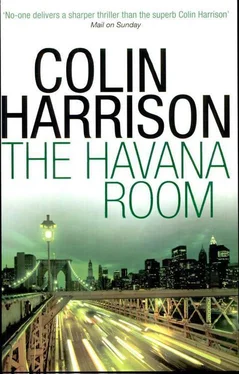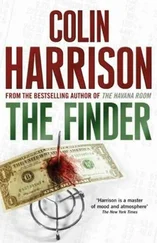Colin Harrison - The Havana Room
Здесь есть возможность читать онлайн «Colin Harrison - The Havana Room» весь текст электронной книги совершенно бесплатно (целиком полную версию без сокращений). В некоторых случаях можно слушать аудио, скачать через торрент в формате fb2 и присутствует краткое содержание. Жанр: Триллер, на английском языке. Описание произведения, (предисловие) а так же отзывы посетителей доступны на портале библиотеки ЛибКат.
- Название:The Havana Room
- Автор:
- Жанр:
- Год:неизвестен
- ISBN:нет данных
- Рейтинг книги:5 / 5. Голосов: 1
-
Избранное:Добавить в избранное
- Отзывы:
-
Ваша оценка:
- 100
- 1
- 2
- 3
- 4
- 5
The Havana Room: краткое содержание, описание и аннотация
Предлагаем к чтению аннотацию, описание, краткое содержание или предисловие (зависит от того, что написал сам автор книги «The Havana Room»). Если вы не нашли необходимую информацию о книге — напишите в комментариях, мы постараемся отыскать её.
The Havana Room — читать онлайн бесплатно полную книгу (весь текст) целиком
Ниже представлен текст книги, разбитый по страницам. Система сохранения места последней прочитанной страницы, позволяет с удобством читать онлайн бесплатно книгу «The Havana Room», без необходимости каждый раз заново искать на чём Вы остановились. Поставьте закладку, и сможете в любой момент перейти на страницу, на которой закончили чтение.
Интервал:
Закладка:
Yes, one rainy November morning it was water that interested me, how it arrived in the city and how it left, having touched the people I no longer knew. The waterways of Manhattan begin as bubbling streams one hundred miles north, and become enormous aqueducts roaring through bedrock ninety feet below street level that divide upward into a jungle of pipes that telescope ever narrower as water is pushed hundreds of feet into the air, captured in rooftop tanks, then released through iron to brass, chromed steel, even gold plate. Water, pure as rain, but for the fluoride added upstream, and maintained at relatively constant upward and downward pressure but certain always to be recaptured by pipes and fall earthward- flushed, emptied, drained, trickling from spigots and immediately mixed with coffee grounds, urine, food parts, hair, menstrual blood, including, I imagined, that of Wilson Doan's wife, toothpaste rinse, dirt, vomit, the cold semen of Wilson Doan himself (were they trying to have another child?), cigarette butts, Adolphus Clay III's salt-and-peppery whiskers, the soap scum left from Larry Kirmer's 5 a.m. prework shower, Dan Tuthill's confettied credit card receipts and other small documents of compromising information, and the skin cells from Selma's sweet but disappointed face. This muddy stew, this broth of humanity, joined the rain when it came in sheets across the glassy facades of the skyscrapers, running down copper roofs, tar paper, asphalt shingles, aluminum gutters, the windows my son used to gaze through, downspouts, gargoyles, granite facing, bricks of every shape and color, marble, brownstone, painted clapboard, vinyl siding, rusting fire escapes, air-conditioning units, including those that had cooled my wife's skin after she'd screwed Wilson Doan, furnace exhaust vents, the vacuum-sealed double-paned windows illuminating my former law firm office (a new partner in there now, on the phone, safe as a man could be), the rain rattling the leaded colored glass of the church windows where young Wilson Doan was mourned, the penthouse cedar decking where his father drank martinis in the summer… down all these, passing rivets, screws, nails, bolts, mortar joints, caulking, television antenna wire, security cameras either swiveling or of fixed position, including the ones outside our former apartment house that recorded the removal of young Wilson's motionless body to an ambulance, the billioned drops of this vertical floodplain carrying leaves, incinerator soot, a dusting of lead and heavy metals, pigeon and rodent matter, paint chips, rust, volumes of dead and dying insects, the whole mingled sedimentary waterfall plummeting back below street level, sewered and forgotten…
… yes, you may do nothing in Manhattan but tramp around in a suit and tie and study the rainfall, but you still need to watch out where the hell you're going. Which, that soggy November day, as I descended the subway steps at Sixth Avenue and Thirty-fourth Street, I didn't do. The sky had broken open, and everywhere the streets were flooded, taxis splashing sidewalks, oily runoff gurgling into storm drains. I'd completed my idiot disguise that morning with an umbrella, a raincoat, and a week-old copy of The Wall Street Journal. But I failed to notice the muddy waterfall pouring over the header above the subway stairs, and when I felt the cold shower upon me- and leapt sideways- I ran headlong into a younger man in a studded leather jacket as he hurried up the stairs.
"Fucking business freak." He squared his shoulders and I noticed the rings in each nostril, the tattooed tiger coiled around his neck.
"Accident," I sputtered. "Sorry."
"I guess you are." He swung his fist, hitting me once in the jaw, squarely and with authority, as if he'd done it many times before. I fell back onto the slippery stairs, holding my mouth.
"You keep running into people, they're going to fuck up your executive shit, man." He glared, then continued up the steps.
I slumped to one knee, then both, pain ricocheting around my head. Finally I steadied myself and looked up. Had anyone seen the assault? A gaggle of teenage Chinese girls swept down the stairs past me, all colored raincoats and gossiping happiness. In the sluicing downfall they barely noticed me. I spat out a broken molar and staggered back upward, tonguing the throbbing place in my jaw and wanting nothing so much as a drink and a dry place to sit down. Any goddamn place would do. Any place where civilization was still intact. My head hurt as much as my jaw. In front of me a group of young businessmen sporting blue umbrellas with identical corporate logos jostled merrily along Sixth Avenue. I followed them, a lurching figure with a hand to his cheek. The men turned at Thirty-third Street, then disappeared through a big door flanked by potted evergreens. EST. 1847, claimed the gold lettering on the glass. It was an old-time Manhattan steakhouse. I'd passed the place a hundred times before, but never gone inside. Now I did, pulling open the heavy door.
And that- the greasy glass of milk, the long fall from grace, the sudden punch to the head- was how I discovered the Havana Room.
Two
From the outside, you saw only the gold script and the heavy doornothing that suggested how big the place really was, nor what went on inside, and with whom. You stepped down to the main floor, a vault of mahogany hung with nineteenth-century oils (railroads, western expansion, warships under sail), and there you submitted to the aroma of steak. The maitre d' greeted every arrival from his station, and once you penetrated his skepticism, two blond assistants conveyed you to a table. One could order oysters Rockefeller or Scottish smoked salmon as an appetizer, but these were merely prelude to the fifteen-ounce filet mignon au poivre, the incomparable New York sirloin, or, say, the sixteen-ounce Kobe. Real gut-droppers and heart-stoppers. The cost? Too much, of course, and washed down with liquor marked up five times from wholesale. But no one cared. Each day the place moved four hundred lunches, mostly to office dwellers along Sixth Avenue and Broadway, as well as to a smattering of midwestern and Japanese tourists who believed, incorrectly, that the restaurant represented no more than a quaint exercise in nostalgia and American history. After the lunch rush, however, in the lingering long afternoons and swelling nights, the joint filled with its real customers- space-peddlers and debt-dealers, sex-biters and lie-eatersthe very people, in other words, who've always made New York City so grand.
As soon as I stumbled inside on that rainy winter day, I was seized by the dark, agreeable gravity of the place- the chair-rubbed wainscoting, the ceiling smudged by lamp smoke. Nothing was dingy but all was broken in, softened by the centuries. Within a few minutes I'd sipped a shot of whiskey, which eased the pain in my jaw, and had tasted a bowl of steaming chowder- my first real pleasure, I realized, in quite some time. On the wall next to me hung a map of Manhattan that showed the coastal contours of the island before they were filled in, the inlets and streams and swamps now gone. Next to it hung a framed newspaper account of the great fire of 1835 that specified the tragedy's death count, as well as the lost value of incinerated shops, saddle manufacturers, and apothecaries. Dry rot crept over the yellowed paper into the columns, turning the crisp, type-struck letters into blank, unreadable clouds. Even great catastrophe, it seemed, would be forgotten in time. And this was a comfort. No one knew me here, I realized, no one suspected me of failure or accidental murder, no one begrudged me my soup, my heavy spoon.
I came back that same night, wearing a fresh shirt, and the next day, and the day after that, ten of the next ten nights. I ate, I drank, I chatted with whomever. Screw the cost. Why had no one told me of the place? Where had I been? In those first few weeks I spied newborn movie stars and living-dead politicians, rappers in ghetto-fab white furs, the nation's most prominent feminist theorist (a heavy napkin tucked into her shirt as she chewed her meat savagely), the mayor and his bickering entourage, the city's most famous call girl (a Russian woman, she dined alone, with reading glasses and a book), and members of all New York's professional teams. Presidents and prizefighters had also eaten there, long ago, but no one really cared, because new action was available every night, pounding heavily, cigar in hand, up the stairs that led to the Churchill and Roosevelt Rooms (reserved for private parties six months in advance, piano for hire, strippers allowed), or sitting too mysteriously at the junior bar, smoking with impunity and waiting- perhaps for you. They came exactly because the place was not new, not suddenly famous for its piquant sauces or artful arrangement of vegetables; no, the terms of the transaction had nothing to do with recent discovery, but rather with what was long proven: that you and I and all of us were doomed. The paintings and lithographs on the walls featured only the far departed, and to eat beneath their unchanging gaze was thus to understand- no matter how lovely her smile, no matter how handsome his wallet- that it did not matter if you polluted your lungs or liver or gut with the good stuff being served, because a man or a woman's life was itself just a short meal at the table, so to speak, and one had an obligation to live well and live now, to dine heartily by the logic of the flesh.
Читать дальшеИнтервал:
Закладка:
Похожие книги на «The Havana Room»
Представляем Вашему вниманию похожие книги на «The Havana Room» списком для выбора. Мы отобрали схожую по названию и смыслу литературу в надежде предоставить читателям больше вариантов отыскать новые, интересные, ещё непрочитанные произведения.
Обсуждение, отзывы о книге «The Havana Room» и просто собственные мнения читателей. Оставьте ваши комментарии, напишите, что Вы думаете о произведении, его смысле или главных героях. Укажите что конкретно понравилось, а что нет, и почему Вы так считаете.












